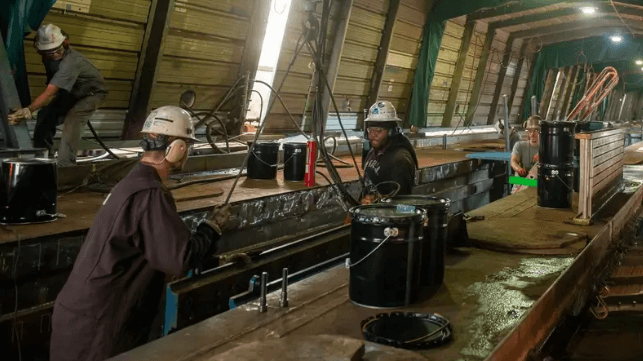Trump Plans to Impose 25 Percent Tariffs on Steel and Aluminum

On Sunday, U.S. President Donald Trump announced plans to impose a 25 percent tariff on all steel and aluminum imports, repeating a policy from his first term. The announcement includes metal imports from Mexico and Canada, the largest foreign suppliers for the American steel market.
U.S. steelmakers stand to benefit from the announcement. Independent economists say tariffs will allow U.S. producers to raise prices, strengthening American steelmakers' balance sheets. The tariffs Trump imposed in his first term increased prices by nine percent and raised American steelmakers' earnings by $2.4 billion in 2018 alone, according to the Peterson Institute for International Economics. American steel consumers' costs increased by an estimated $5.6 billion during the same period, the institute estimated.
Shares in America's biggest steel producer, Nucor, have risen by 10 percent over the last month following news of tough tariff policies, and the company is supportive of Trump's approach. "Nucor applauds the first steps taken by President Trump in his America first trade agenda," Nucor President Leon J. Topalian said in a statement last week. "We look forward to working with President Trump to enforce our trade laws and strengthen American manufacturing!"
Trump's Sunday announcement was greeted with disapproval in Canada, which has the most to lose from higher import prices in the U.S. market. "This is the next four years. Shifting goalposts and constant chaos, putting our economy at risk," responded Ontario Premier Doug Ford in a statement.
Overall, more than $80 billion worth of steel and iron imports and nearly $30 billion worth of aluminum imports will be affected. If the metals tariffs are not reversed in negotiations, as occurred earlier this month with blanket tariffs on Canada and Mexico, American shipbuilders will be among the steel users most affected by an increased cost of materials. The U.S. shipbuilding industry's biggest customer by value - the U.S. Navy - will likely see future newbuild and repair costs rise if tariffs take hold, according to defense analysts.
"Costs [for shipbuilding] are going to go even higher," said Todd Harrison, a senior fellow at the pro-business think tank American Enterprise Institute, speaking to Navy Times last month. "Delays will get even longer. Nothing good is going to come from this for shipbuilding; it can only make a bad situation worse."
Tariffs are part of Trump's plans for a revival at U.S. Steel, the second-largest producer in the United States and a onetime icon of American industry. On Friday, Trump said he would block plans by Japanese giant Nippon Steel to purchase U.S. Steel, as the Biden administration did in January. However, he said he would "mediate and arbitrate" a lesser investment by the Japanese firm. "Tariffs are going to make [U.S. Steel] very successful. And I think it has good management," Trump said.
Sources close to U.S. Steel and Nippon Steel told the Pittsburgh Post-Gazette that executives at both firms were surprised by Trump's plans.
There may be additional tariffs coming soon: On Sunday, Trump briefly previewed a plan to impose reciprocal tariffs when other nations place duties on U.S. goods. "It won't affect everybody, because there are some where we have similar tariffs, but the ones that are taking advantage of the United States, we're going to have a reciprocity," he said.
